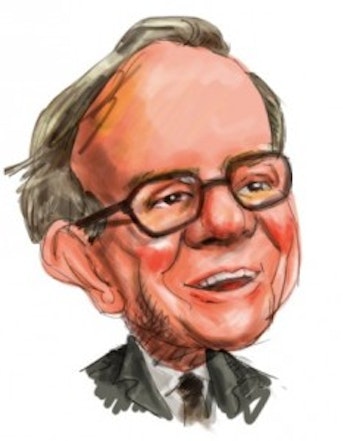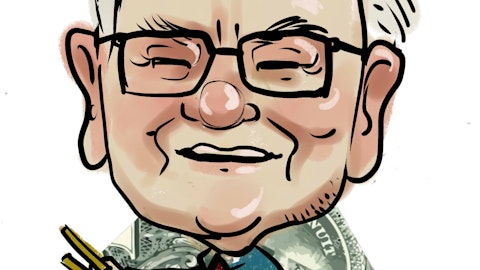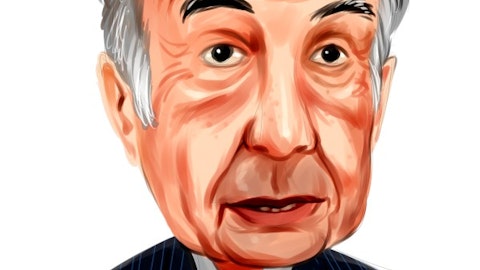
My post of Monday August 20 closed with the following comment: “as one reads a book like ‘More Money Than God’ by Sebastian Mallaby, one observes that lots and lots of money is made off of government mistakes. The problem is that generally the people that make the money off of these mistakes are people that have the information, the access, and the scale to take advantage of the mistakes. However, these ‘tools’ are not available to most people. Maybe that is why the distribution of wealth in the United States has become so skewed.”
Warren Buffett: Investor or Trader? (Yahoo)
Earlier this week we learned that Warren Buffett’s Berkshire Hathaway (BRK-A) recently backed out of credit-default swaps (CDS) in the municipal bond market. Berkshire terminated $8.25 billion in swaps that were not set to expire for another five years, according to government filings. The Wall Street Journal says Berkshire’s move “raises a red flag,” possibly signalling that the Oracle of Omaha is turning bearish on municipalities. According to Lee Munson, head of Portfolio LLC and author of the book Rigged Money, Buffett is merely looking for a trade. “The dude still has $8 billion of exposure,” notes Munson, “so he basically cut his exposure in half.” The CDS amount to insurance against municipal bond failure. The idea of reducing exposure now would be to resell the contracts later at a better price. It’s a position shift, not a sea change.
Buffett Foundation Worker Who Made $190K A Year Admits To Stealing From Charity (BusinessInsider)
A senior employee for Warren Buffett’s foundation pleaded guilty Tuesday to stealing $46,000 by doctoring receipts for work trips, the Omaha World-Herald reports. Dhaval Patel, 38, made $190,000 a year as a senior program officer for the foundation, traveling the world to monitor the charities supported by Omaha’s famed billionaire Warren Buffett.
Warren Buffett’s Latest Moves: Two Significant Shifts In Strategic Focus (SeekingAlpha)
When the largest wealth managers in the world make significant portfolio changes it is big news. Individuals and institutions buy and sell companies for many reasons, but the sum of a portfolio is usually bigger than its parts, and investment strategies almost always involve macro assumptions. Warren Buffett’s primary investing focus for over three decade has been value. While the Omaha native built his original portfolio in the 1980s around American companies such as Coca-Cola (KO), Procter & Gamble (PG), and Walmart (WMT), Buffett has also had strong positions in Chinese equities, European banks, and many other investments over the past decades.
Did Warren Have Help In His Muni Call? (ForexPros)
So I hear that Warren Buffett took another tubby and decided that Municipal Bonds were no longer a good thing to own. First questions: Was Meredith Whitney in the tub with him? Second: Dude what are you thinking? Giving him the benefit of the doubt and since he is a longer term investor let’s start with a look at the weekly chart to see what is out there. The Andrew’s Pitchfork shows a break of the Lower Median Line followed by a retest and now a move back lower. Still over the Hagopian trigger line, which would indicate a bear move lower, but with the Relative Strength Index (RSI) bullish and Moving Average Convergence Divergence indicator (MACD) running flat, there is cause for caution but not a time to short yet.
Warren Buffett Cancels A Municipal Debt Bet 5 Years Early (BusinessInsider)
Berkshire Hathaway Inc. terminated a large wager on the municipal-bond market five years early, the Wall Street Journal quoted a person familiar with the transaction as saying. In a quarterly regulatory disclosure filed this month, the Warren Buffett-owned company terminated credit-default swaps insuring $8.25 billion of municipal debt. The paper said the early termination is deepening questions among some investors about the risks of buying debt issued by cities, states and other public entities.
Buffett’s Next Move: His Biggest Yet? (Fool)
Berkshire Hathaway (NYSE: BRK-A) (NYSE: BRK-B) shocked more than a few investors last week when the company disclosed what amounted to a stock selling spree by CEO Warren Buffett. Financial filings for the quarter showed that Berkshire sliced its stake in pharma giant Johnson & Johnson by almost two thirds. Berkshire also took the hatchet to positions in long-time Buffett favorites Kraft and Proctor & Gamble, too, while liquidating the company’s entire holding in Intel. Coming from a man who has described his favorite stock holding period as “forever,” those sales raised eyebrows.
Chuck Huggins, former See’s Candies CEO, dies at 87 (BizJournals)
Former See’s Candies president and CEO Charles Newel Huggins, better known as Chuck, died Aug. 19 in Larkspur after spending more than a half century building the South San Francisco candy company. …He joined See’s Candies in 1951 as a manager in the packing department and led the company as president and CEO from 1972 to 2006. He was instrumental in negotiating the 1972 sale of the company on behalf of the See family to Warren Buffett’s Berkshire Hathaway. (NYSE: BRK) (NYSE: BRK.A) (NYSE: BRK.B)
Don’t Sell Yourself Short: ETF Edition (SeekingAlpha)
At Morningstar, we do not recommend that the average investor engage in short-selling. Successfully betting on market downturns is very difficult, and even the most intrepid investors find it difficult to consistently execute an effective shorting strategy. Stock prices tend to rise over time, so shorting should be done only tactically and for a short period of time, if at all. As he often does, Warren Buffett gives some sage advice on the topic: “It’s an interesting item to study. It’s ruined a lot of people. You can go broke doing it. Everything we’ve ever thought about shorting worked out eventually, but it’s very painful. It’s a whole lot easier to make money on the long side. You can’t make big money shorting because the risk of big losses means you can’t make big bets.”
Warren and Charlie and the chocolate factory (Fortune)
In response to a formal email about setting up a sit-down interview with Charlie Munger, his assistant simply wrote: “Charlie says to come over tomorrow at 8:30.” It wasn’t what I had expected. And it was a bit early for me, being new to Los Angeles traffic and tired from the long previous day of touring the See’s Candies plant in L.A. (it was a grueling task, but some intrepid writer had to do it.) Being told to simply show up at Munger’s private home in Los Angeles on a Wednesday morning in May felt starkly casual compared to my meeting with Warren Buffett, which would be the next day and had been scheduled far in advance. I would be flying to Omaha for it that night.




